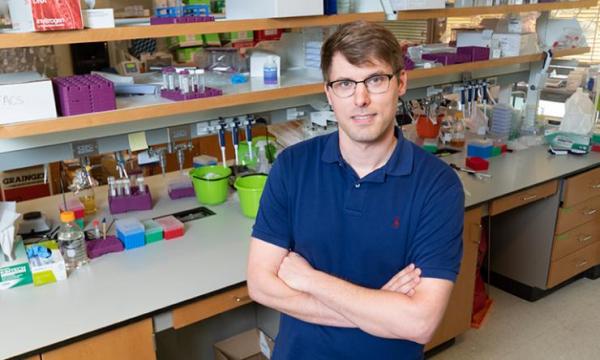James Dahlman, assistant professor in the Wallace H. Coulter Department of Biomedical Engineering at Georgia Tech and Emory, and a researcher in the Petit Institute for Bioengineering and Bioscience at Georgia Tech, is one of this year’s four winners of the 2020 Outstanding New Investigator Award given by the American Society of Gene & Cell Therapy (ASGCT).
He is also the recipient of the Outstanding Achievement in Early Career Research 2020 award given by the Georgia Institute of Technology.
Dahlman's laboratory works at the interface of drug delivery and genomics by applying "big data" and "technology development" approaches to nanomedicine. Dahlman and his students have developed DNA barcoded nanoparticles to measure how hundreds of nanoparticles deliver mRNA and siRNA in multiple cell types in vivo, all from a single animal. Since late 2016, the lab has used this approach to quantify more than 4,500 nanoparticles in vivo, thereby identifying nanoparticles that target new cell types without ligands. His lab hopes to apply systems biology approaches to nanomedicine, in order to improve the efficacy of gene therapies and identify genes acting as master regulators of nanoparticle delivery in vivo.
Dahlman explained that using DNA barcodes allows researchers to overcome what had been a laborious and time-consuming process. Now hundreds of different nanoparticle types can be tested at once to see which are more effective to safely deliver drugs. His research has spawned the creation of a new company called GuideRX.
About ASGCT: The American Society of Gene & Cell Therapy is the primary professional membership organization for gene and cell therapy. The Society's members are scientists, physicians, patient advocates, and other professionals. Members work in a wide range of settings including universities, hospitals, government agencies, foundations, and biotechnology and pharmaceutical companies.
The mission of ASGCT is to advance knowledge, awareness, and education leading to the discovery and clinical application of genetic and cellular therapies to alleviate human disease. ASGCT's strategic vision is to be a catalyst for bringing together scientists, physicians, patient advocates, and other stakeholders to transform the practice of medicine by incorporating the use of genetic and cellular therapies to control and cure human disease.
Media Contact:
Walter Rich
Communications Manager
Wallace H. Coulter Department of Biomedical Engineering
Georgia Institute of Technology
Media Contact
Walter Rich
Keywords
Latest BME News
Jo honored for his impact on science and mentorship
The department rises to the top in biomedical engineering programs for undergraduate education.
Commercialization program in Coulter BME announces project teams who will receive support to get their research to market.
Courses in the Wallace H. Coulter Department of Biomedical Engineering are being reformatted to incorporate AI and machine learning so students are prepared for a data-driven biotech sector.
Influenced by her mother's journey in engineering, Sriya Surapaneni hopes to inspire other young women in the field.
Coulter BME Professor Earns Tenure, Eyes Future of Innovation in Health and Medicine
The grant will fund the development of cutting-edge technology that could detect colorectal cancer through a simple breath test
The surgical support device landed Coulter BME its 4th consecutive win for the College of Engineering competition.








